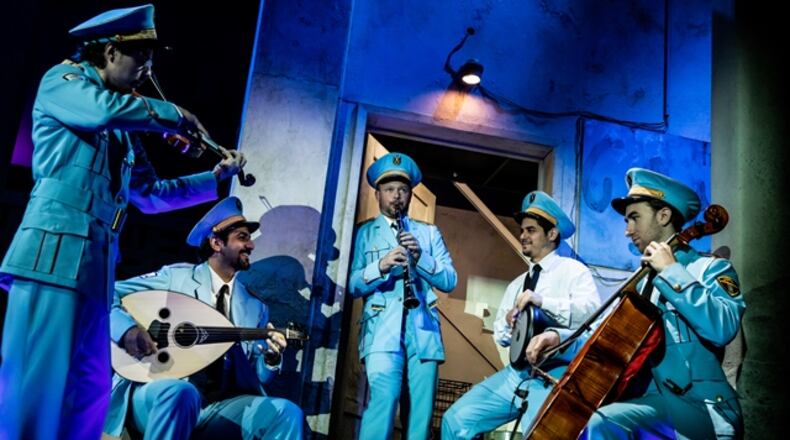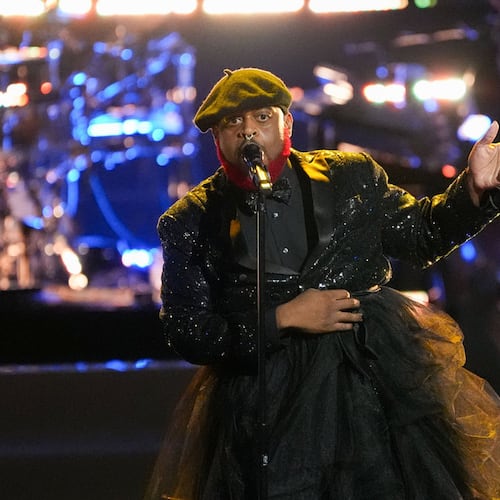“The Band’s Visit” is an outlier in the realm of Broadway musicals.
It isn’t an ostentatious production, but a quiet unfolding over the course of a day. Its story — a group of Egyptian musicians in the Alexandria Ceremonial Police Orchestra wind up in the wrong city in Israel after a simple miscommunication about their bus tickets — focuses on the little details about fate.
Everything about it screams Off-Broadway, which is where the musical debuted in late 2016.
But when the show, based on the 2007 Israeli movie of the same name, moved to Broadway in the fall of 2017, it quickly snagged breathless critical accolades that manifested into a staggering 10 Tony Awards in 2018 (it was nominated for 11).
That haul, which included best musical, best score for David Yazbek, best book for Itamar Moses and best direction of a musical for David Cromer, propelled the show commercially and allowed it to recoup its $8.75 million investment — a rarity among Broadway musicals, especially the ones that don’t turn into commercial titans (see: “Hamilton,” “Wicked”).
The show ended its Broadway run in April 2019 and is roaming the country on its first national tour, which plays the Fox Theatre Jan. 21-26.
In a recent conversation with Cromer, he acknowledged that he’s a “little nervous” about “The Band’s Visit” playing a venue as large as the Fox. But the tour prepared for its largest houses by “tending to the clarity — visual and aural — from the farthest seat.”
The director still randomly pops in on tour dates for quality control, but he’s currently occupied in his Chicago hometown directing “Bug” at the Steppenwolf Theatre and preparing for its Jan. 23 opening.
Cromer took a break from “Bug” to chat about the uniqueness of “The Band’s Visit.”
Q: Were you surprised at the rapturous critical reaction and then the industry accolades from the Tonys?
A: I really hoped for it and I believed that there is an audience for the kind of show we wanted to do — which is not a repudiation of any other kind of show — but this is a delicate story that tells its tale in a very subtle way. The hope and the despair and the redemption and the new lease on life that some of the characters get in this show was the story we had to tell. We hoped it was going to be well regarded. We were always aiming for a commercial future, but we wanted to stick to our guns about the way we told the story. So I was not surprised, but I was very encouraged that people liked it. And I was relieved!
Q: It’s one of those beautiful stories where a small miscommunication changes the trajectory of life.
A: Seismic things happen to these people in their lives. Seismic personal things and everyone who has an open heart for this play recognizes that. It is a dumb little accident one night that really lets some of the pain be taken away for these people.
Q: Given that the story takes place over one night, what, as a director, was your biggest challenge to keep a steady flow of the story?
A: It was a challenge but I knew right away that I wanted it to float. I wanted the audience to float through the town like a leaf. We designed the show around trying to create a seamless flow from the beginning to the end. There's only one blackout in the entire show. The story is always happening, even in the scene shifts, because the show is built around several turntables. Even though the show appears to be quite small, the machinery is always carrying your eyes and your brain through the town.
Q: How do you tell this story without it becoming political?
A: One of the things we felt was that not everyone was political. The show is about how the governments are political, the governments are fighting. But are the people fighting? (The story) is intended to be fraught with the circumstance that these Egyptian musicians are stuck in the middle of Israel. But when people see a fellow human in a tight situation who doesn't look like he's there to harm you, you suddenly say, "What can I do to help?" Everyone is a stranger, and how you respond to a stranger is one of the things the play explores. It's set up to be political, but it turns into something more human.
Q: How familiar were you with David Yazbek’s music before signing on to direct?
A: I knew his music from theater well. I knew the theme to (PBS series) "Where in the World is Carmen Sandiego?" He'd written the music for these two raucous male comedies, "The Full Monty" and "Dirty Rotten Scoundrels" as well as "Women on the Verge of a Nervous Breakdown," which has a fantastic score. As soon as I heard David was involved, when they called about directing I just thought, "I want it, I want it, I want it!" When I heard demos of "Welcome to Nowhere" (for this show), which has this easy groove to it, I was like, "This is good. I have to get this job."
Q: How do you describe the show to people who haven’t seen it?
A: There's a lyric I use from one of the show's songs, "Something Different" — "nothing is as beautiful as something that you don't expect."
Follow the AJC Music Scene on Facebook and Twitter.
THEATER PREVIEW
“The Band’s Visit”
7:30 p.m. Tuesday-Thursday; 8 p.m. Friday; 2 p.m. and 8 p.m. Saturday; and 1 p.m. and 6:30 p.m. Sunday. $35-$119. Fox Theatre, 660 Peachtree St. NE, Atlanta. 1-855-285-8499, www.foxtheatre.org.
About the Author
Keep Reading
The Latest
Featured





